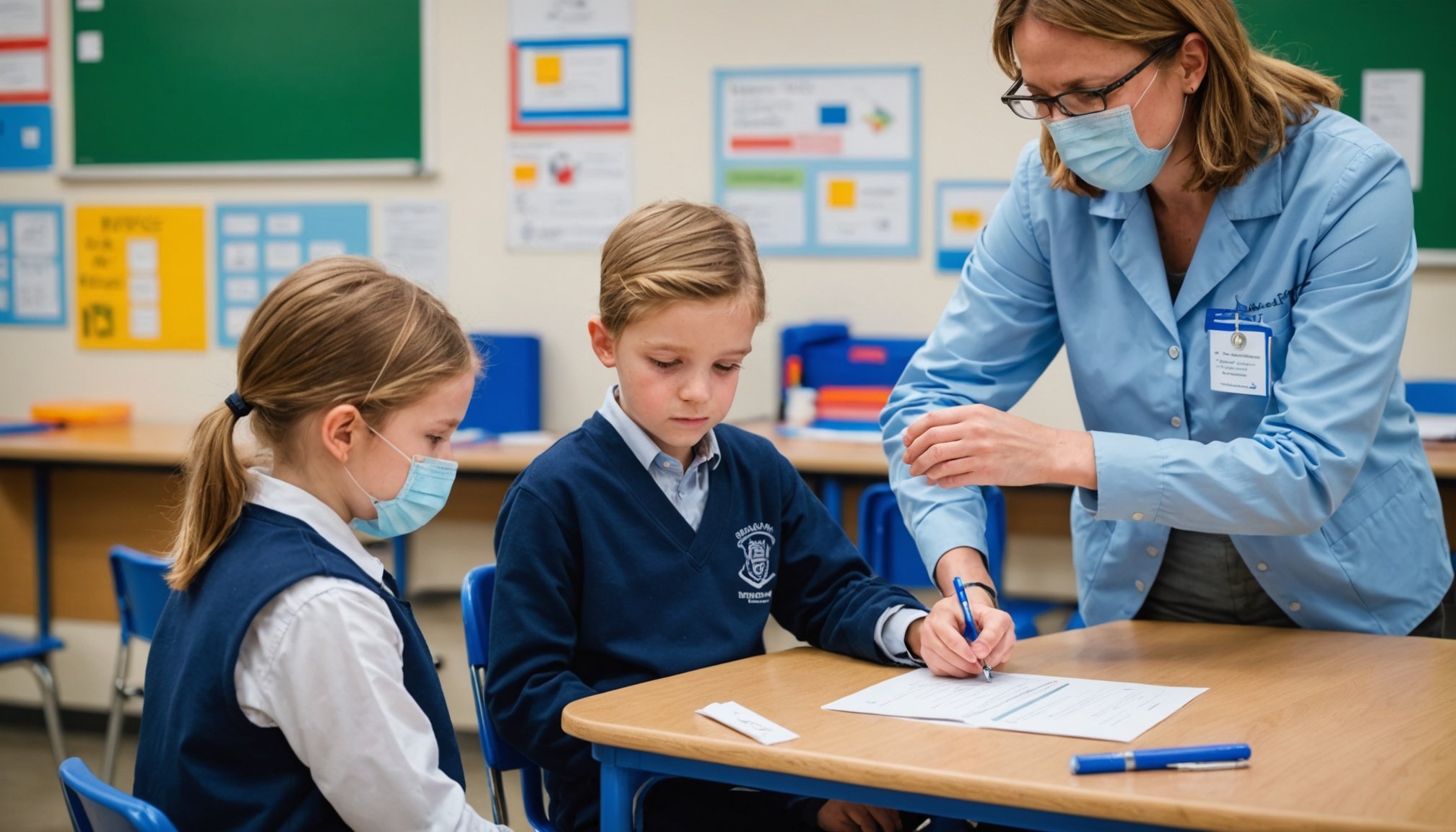Overview of Essential Vaccinations for UK Schools
In ensuring public health and safety within educational settings, the UK mandates several essential vaccinations for school entry. These requirements are pivotal in curbing the spread of infectious diseases among children and staff.
Key Vaccinations Required
Among the fundamental vaccination requirements are the MMR (Measles, Mumps, and Rubella) vaccine, DTaP/IPV (Diphtheria, Tetanus, Pertussis, and Polio), and the MenACWY vaccine, targeting Meningococcal diseases. It’s also crucial for children to receive additional doses according to the NHS vaccination schedule as they progress through school.
Also to see : Best bracelet making kits for friendship bracelets
Importance of Vaccination
Vaccinations are vital for public health, acting as a shield against outbreaks. They ensure that children can benefit from learning in a safer school environment, free from the threat of contagious illnesses. By aligning with vaccination requirements, schools significantly reduce absenteeism and promote a healthier community.
2023-2024 Academic Year Updates
With the approaching 2023-2024 academic year, updates to vaccination policies may include booster recommendations, addressing new health challenges. Schools and parents should stay informed through regular communications with healthcare providers and educational authorities to comply with any changes in the vaccination overview.
In parallel : How to Challenge Your Council Tax Banding in Wales: A Step-by-Step Guide for 2023
Prioritising vaccinations ensures a robust defense against potential health crises, safeguarding the well-being of students and educators alike.
Vaccination Schedule and Requirements
Understanding the vaccination schedule is crucial for parents ensuring their children meet the UK educational requirements. The schedule is designed to protect children from preventable diseases by administering vaccinations at key developmental stages.
Vaccination Timeline
Vaccinations are strategically timed to maximise protection. From birth, the timeline specifies when each dose should be delivered. For instance, the first set is typically given within the first year. Subsequent vaccines follow during preschool years, aligning with school age vaccinations. This careful timing ensures immunity before children encounter crowded school environments.
Age-specific Requirements
Each age group has distinct requirements. Infants often begin with critical vaccinations for diseases like whooping cough and polio. As children grow, additional vaccines such as the MMR (measles, mumps, rubella) are introduced. It’s essential for guardians to adhere to these stipulations for their children’s health and their peers’ safety.
Legislative Mandates
The UK mandates specific immunisations for children entering public educational systems. Parents must present up-to-date vaccination records as per school guidelines. This policy aims to maintain herd immunity and reduce outbreaks of diseases within school communities. Compliance is not merely a personal choice but a civic duty, protecting society at large. Understanding these mandates helps parents prepare appropriately for school admission processes.
Individual Vaccines: Details and Benefits
Understanding the importance of individual vaccines is vital for safeguarding health. Each vaccine serves unique purposes and exhibits specific immunization details contributing to its effectiveness.
MMR Vaccine
The MMR vaccine protects against measles, mumps, and rubella. Administered typically in two doses, its benefits include preventing these highly contagious diseases, which can cause serious complications. The immune response involves the body developing robust antibodies that offer long-term protection. It is recommended for children at 12-15 months, with a second dose at 4-6 years.
DTaP Vaccine
The DTaP vaccine is another essential immunization, targeting diphtheria, tetanus, and pertussis (whooping cough). This vaccine benefits individuals by preventing these severe illnesses, often fatal in young children. Following administration, the body builds immunity against these diseases, reducing their occurrence significantly. The ideal age for this vaccine is at 2, 4, and 6 months, with additional doses during early childhood.
HPV Vaccine
Finally, the HPV vaccine plays a crucial role in preventing human papillomavirus infections, which can lead to various cancers. It stimulates the immune system to create a defensive barrier against specific strains of HPV. For the best protection, it is recommended to be administered at 11-12 years, though it can start as early as 9 years, with catch-up vaccinations available into early adulthood.
Exceptions and Exemptions
Navigating the world of vaccinations sometimes includes understanding vaccination exemptions. These exemptions are critical for individuals who are unable to receive vaccinations for certain legitimate reasons, falling under two primary categories: medical exceptions and religious considerations.
Medical Reasons for Exemptions
Medical exceptions are granted when a person has a health condition that contraindicates them receiving a vaccine. These might include severe allergies to vaccine components or medical situations like undergoing chemotherapy, which compromises the immune system. A healthcare provider will typically evaluate and verify these conditions before an exemption is granted.
Religious Exemptions and Procedures
On the other hand, religious considerations allow parents or individuals to opt out due to sincerely held religious beliefs. To process a religious exemption, one must generally submit a formal request to educational institutions or relevant authorities, explaining the basis of their objection.
Parental Guidance on Opting Out
For parents considering opting out, it is essential to understand the regulations in their region, as these can vary significantly. They should consult with healthcare professionals for comprehensive advice and follow appropriate legal procedures to ensure the exemption is recognised. Being informed and adhering to formal requirements can make this process more seamless and straightforward.
Possible Side Effects and Management
Navigating the journey of vaccination involves understanding potential reactions and how to manage them effectively.
Common Side Effects
Post-vaccination, your body might experience certain typical reactions as it builds immunity. Common vaccine side effects include mild fever, fatigue, and soreness at the injection site. These symptoms are generally short-lived and should resolve within a few days. It’s your body’s natural response to developing protection against future infections.
When to Seek Medical Attention
While most side effects are benign, you should be vigilant for specific signs requiring medical attention. Seek assistance if you encounter symptoms such as severe or prolonged fever, difficulty breathing, or swelling that extends beyond the area of injection. These could indicate an atypical response to the vaccine and might need immediate professional evaluation.
Best Practices for Post-Vaccination Care
Post-vaccination care is pivotal in easing discomfort and promoting recovery. Here are some beneficial practices:
- Rest well and stay hydrated to help your body recover.
- Apply a cool, damp cloth to the injection site to reduce swelling.
- Over-the-counter pain relief can be used to alleviate discomfort, but consult with your healthcare provider first.
Understanding and managing these aspects ensure a smoother vaccination experience and bolster your confidence in the process.
Resources and Further Information
Access to trusted vaccination resources is crucial for making informed health decisions. In the UK, the NHS guidance is a primary source for reliable and up-to-date information about vaccines. It provides detailed explanations on various vaccines, side effects, and the recommended schedules for different age groups. The government health department also offers resources, particularly useful for policy updates and public health guidelines, ensuring the community remains informed and safe.
When deciding on vaccinations, consulting with healthcare providers is imperative. They offer personalized advice tailored to an individual’s medical history, current health status, and potential risks. This personalized approach ensures that the information and recommendations are applicable to each unique situation.
Additionally, many community vaccination programs are available, designed to support and increase access to vaccines. These programs often include educational workshops and clinics, simplifying the process for individuals to stay up-to-date with their vaccinations. Such initiatives ensure that everyone, regardless of background or circumstance, can access necessary healthcare resources.
Remaining informed with accurate information from NHS and government resources, alongside consultations with healthcare professionals, helps navigate the vaccination process effectively.











